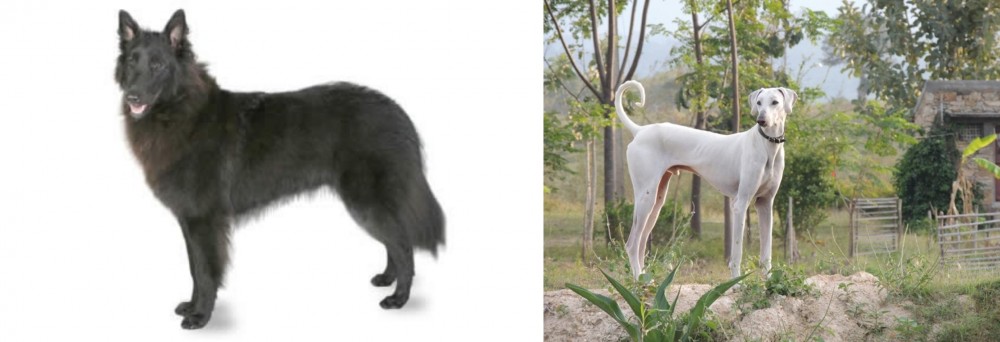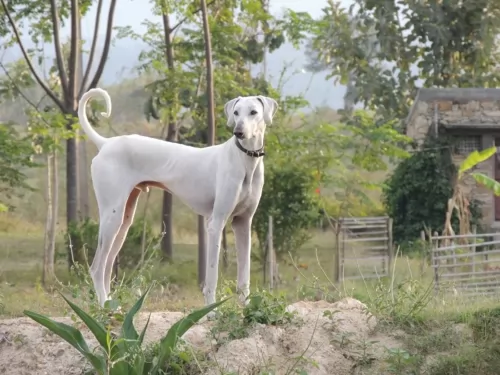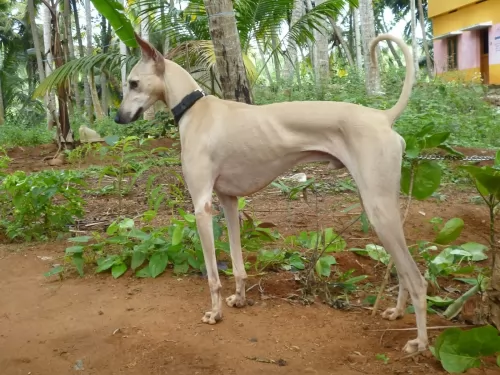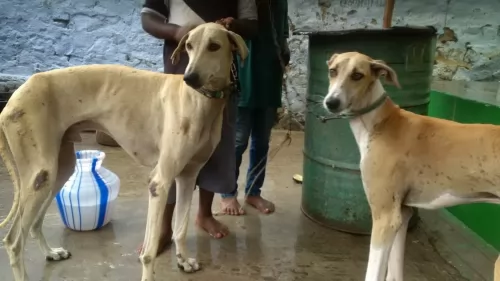 Petzlover
Petzlover Belgian Shepherd is originated from Belgium but Chippiparai is originated from India. Both Belgian Shepherd and Chippiparai are having almost same height. Belgian Shepherd may weigh 10 kg / 23 pounds more than Chippiparai. Both Belgian Shepherd and Chippiparai has almost same life span. Belgian Shepherd may have more litter size than Chippiparai. Belgian Shepherd requires Moderate Maintenance. But Chippiparai requires Low Maintenance
Belgian Shepherd is originated from Belgium but Chippiparai is originated from India. Both Belgian Shepherd and Chippiparai are having almost same height. Belgian Shepherd may weigh 10 kg / 23 pounds more than Chippiparai. Both Belgian Shepherd and Chippiparai has almost same life span. Belgian Shepherd may have more litter size than Chippiparai. Belgian Shepherd requires Moderate Maintenance. But Chippiparai requires Low Maintenance
 There are different varieties of the Belgian Shepherd Dog – but these all differ only in color, length and texture of coat. The interesting aspect of the names of the different Belgian Shepherds, is that the names of the different varieties are taken from the individual towns in Belguim from which each variety comes from.
There are different varieties of the Belgian Shepherd Dog – but these all differ only in color, length and texture of coat. The interesting aspect of the names of the different Belgian Shepherds, is that the names of the different varieties are taken from the individual towns in Belguim from which each variety comes from.
This breed dates back to the middle ages, but it was only in 1891 that Professor A. Reul of the Cureghem Veterinary Medical School established standards for the types and actually separated- and distinguishing them. In the UK they are shown as one breed.
 The Chippiparai is a working dog found in India and until recently there has been little interest in the purity of any breed, but rather only an emphasis on the abilities of the dog. They are only beginning to research the origin and history of their native dogs such as the Chippiparai. Not much is known about the origin of the breed except that it is found almost exclusively in Tamil Nadu and Keraia in the southern part of the subcontinent of India. Other than this there is much speculation about the breed’s origin but very little-known facts. It is indeed an ancient breed; however, its origin could be thousands of years ago or simply hundreds of years ago.
The Chippiparai is a working dog found in India and until recently there has been little interest in the purity of any breed, but rather only an emphasis on the abilities of the dog. They are only beginning to research the origin and history of their native dogs such as the Chippiparai. Not much is known about the origin of the breed except that it is found almost exclusively in Tamil Nadu and Keraia in the southern part of the subcontinent of India. Other than this there is much speculation about the breed’s origin but very little-known facts. It is indeed an ancient breed; however, its origin could be thousands of years ago or simply hundreds of years ago.
• Perhaps it is a descendant of the Saluki as it resembles this breed quite a bit. It has been believed for some time that the Saluki is the original sighthound and the source of all sighthound breeds. The Saluki was very popular in the Middle East, especially in Persia and Arabia from which it could easily have spread to India. It would then have been shared from Northern India to Southern India where the Chippiparai is found.
• Perhaps the Chippiparai is a descendent of sighthounds from Central Asia and Afghanistan – the Tazi, Taigan, Hortaya Borsaya or the Afghan Hound. This part of Central Asia had more trade, influence and contact with the Indian subcontinent early in their history than with any other region. The Chippiparai is considered by some to be more like these sighthounds than like the Saluki and the interaction between these regions has a much longer history than the Middle East and India.
• It is also speculated that the Chippiparai might have been developed completely and uniquely from the local street and working dogs. With the civilization of India being one of the oldest in the world, it is considered a possibility that the Chippiparai is the descendent of the Harappan hunting dogs that probably were developed by the Indus Valley or Harappa roiling class.
Wherever the Chippiparai came from, they were the exclusive property of the wealthy and ruling castes. These upper castes were the only ones that could legally hunt with dogs or afford to feed one. The royal classes of Tiruneivell, Thanjavur, and Madurai all fed the popularity of the breed among the upper castes. They were coursing dogs used to chase down the prey once it was sighted. The Chippiparai are incredibly fast runners and would catch almost any prey and either hold it or kill it for their hunter. The Chippiparai, when not hunting, had to be chained so they would not chase any small animal that they saw. This confinement also added to the purity of the breed as random breeding was prevented.
The southern part of the Indian subcontinent is extremely hot with routine temperatures over 100’. The Chippiparai was developed to withstand these extreme temperatures and is more heat tolerant than most any other breed. They also need very little food and are resistant to the many parasites and diseases found in southern India.
Harboring the belief that Indian dogs were not as good as European ones, the occupying countries of Portugal, France, and Britain, had no interest in the Chippiparai, again leaving the breed to develop naturally on their own with little or no interbreeding. They also received no formal recognition because Indian culture only valued the dog for its working abilities. There was no Indian Kennel Club until 1956.
The Chippiparai is now very rarely and only found in the area of its birth. Many believe the breed is in danger of becoming extinct and even though it is now registered with Indian Kennel Clubs it is not often shown in their dog shows. Lovers of the breed are now attempting to get Indians to recognize that the Chippiparai is a great companion animal and attempting to save the breed.
 The Belgian Shepherd is a well proportioned, muscular medium-to-large dog breed. There are the different varieties but they generally stands at 56 – 66cm in height and weighs anything from 25 to 30kg. You get the short haired Malinois and then you also get the Belgian Tervuren and the Groenendal which are fairly long-haired varieties. Their colour shades vary so you can find black with white markings on the chest and feet, you can find light to dark brown and some are even inclined to be brown.
The Belgian Shepherd is a well proportioned, muscular medium-to-large dog breed. There are the different varieties but they generally stands at 56 – 66cm in height and weighs anything from 25 to 30kg. You get the short haired Malinois and then you also get the Belgian Tervuren and the Groenendal which are fairly long-haired varieties. Their colour shades vary so you can find black with white markings on the chest and feet, you can find light to dark brown and some are even inclined to be brown.
All the varieties have long tails, pointed, fully erect ears and black noses. While the Belgian Shepherd isn’t an aggressive dog, he makes an excellent guard dog, being alert, highly energetic and intelligent and easy to train. As with most other dogs, you’ll want to see to it that he is trained and socialized because then he makes a super pet suited to life with a family where there are children and other pets. He has an independent nature and is loyal and protective with his human family.
 The Chippiparai is a typical sighthound although their size and appearance will vary more than that of registered purebred sighthounds. Typically, they will have a long, domed head with small erect ears and dark eyes. Their muzzle will be as deep and wide as the skull but longer. Their legs are straight and long, their chest is roached back and deep, giving them, an appearance very similar to a greyhound or other sighthound.
The Chippiparai is a typical sighthound although their size and appearance will vary more than that of registered purebred sighthounds. Typically, they will have a long, domed head with small erect ears and dark eyes. Their muzzle will be as deep and wide as the skull but longer. Their legs are straight and long, their chest is roached back and deep, giving them, an appearance very similar to a greyhound or other sighthound.
They have a long curly tail, and their coat can vary greatly in color. They are medium sized, and their coat is short, shiny and close. He is very slender and sleek, which along with his long legs gives him that incredible speed. They are thin with visible ribs.
 Energy is a big factor with this beautiful dog, so before you consider one as a pet, be sure that you can take care of his exercise needs. He belongs to the working group of dogs so he won’t enjoy just lazing around day after day. He is wired to be herding livestock and that natural instinct doesn’t disappear once he becomes a pet in your home. With so much energy, he wants a nice sized garden and wouldn’t do well cooped up indoors at all.
Energy is a big factor with this beautiful dog, so before you consider one as a pet, be sure that you can take care of his exercise needs. He belongs to the working group of dogs so he won’t enjoy just lazing around day after day. He is wired to be herding livestock and that natural instinct doesn’t disappear once he becomes a pet in your home. With so much energy, he wants a nice sized garden and wouldn’t do well cooped up indoors at all.
He is a strong, loving dog, and in exchange for your care of him, he will be a loyal, loving, protective friend who will love you to the end.
 The Chippiparai is a loving, gentle family dog if well socialized, well trained and well exercised. They are very intelligent and need human companionship. Once they are living with a human family, they are very protective of that family. They are for the most part peaceful and quiet dogs. They are loyal and loving but they are not overly affectionate. Cuddlers they are not, and they do not like to play rough with children.
The Chippiparai is a loving, gentle family dog if well socialized, well trained and well exercised. They are very intelligent and need human companionship. Once they are living with a human family, they are very protective of that family. They are for the most part peaceful and quiet dogs. They are loyal and loving but they are not overly affectionate. Cuddlers they are not, and they do not like to play rough with children.
Accepting and loving within the family, the Chippiparai are equally hesitant and shy around strangers. They can be suspicious, but they are not aggressive. They are just very aloof with strangers, yet they hardly ever bark.
 The Belgian Shepherd is a hardy dog so if you do your part to provide him with good quality nutrition from the food he eats and you exercise him, he’ll reach the 10-14 years allotted to him.
Just like with any dog, there will be some minor concerns that you need to watch out for -
The Belgian Shepherd is a hardy dog so if you do your part to provide him with good quality nutrition from the food he eats and you exercise him, he’ll reach the 10-14 years allotted to him.
Just like with any dog, there will be some minor concerns that you need to watch out for -
epilepsy, eye problems, cancer, skin allergies and hip dysplasia.
remember to check his teeth and for ticks and parasites as both, if just left, can jeopardise his health seriously.
see that he get his first puppy vaccinations at 6 to 8 weeks of age.
 There are no clinical studies regarding the health and health history of the Chippiparai, so little is known about their long-term health. However, most who know the breed, believe it is an incredibly healthy one. They seem to have a lot less genetically transmitted health issues than other purebreds. Because of their isolation for centuries in India, they have developed immunities and resistance to most parasites and diseases other dog suffer from.
There are no clinical studies regarding the health and health history of the Chippiparai, so little is known about their long-term health. However, most who know the breed, believe it is an incredibly healthy one. They seem to have a lot less genetically transmitted health issues than other purebreds. Because of their isolation for centuries in India, they have developed immunities and resistance to most parasites and diseases other dog suffer from.
Because of this you should look for the types of issues that occur in dogs of this size and build. Have them tested by the Canine Eye Registration Foundation and the Orthopedic Foundation for Animals.
 Your Belgian Shepherd is an energetic dog breed who is social and who wants to be included in your family activities. You can’t just keep him cooped up in your back yard and expect him to do well. He’ll need daily exercise – walks, swims if there is water close by, chasing the ball as well as your companionship.
Your Belgian Shepherd is an energetic dog breed who is social and who wants to be included in your family activities. You can’t just keep him cooped up in your back yard and expect him to do well. He’ll need daily exercise – walks, swims if there is water close by, chasing the ball as well as your companionship.
These dogs are shedders so you’ll certainly be needing to watch your clothes for hairs. You will need to give them a good brush at least twice a week to get rid of all that loose hair and to keep his coat shiny and in tip top condition. Also, he likes the closeness the brushing provides between him and his human caretaker.
The Belgian Shepherd is a robust, healthy breed of dog, but many ill dogs are brought to veterinary clinics because they are suffering with itchy skin problems, they have digestive problems and they’re generally run down. This is because they aren’t provided with a varied and balanced diet plan. Apart from eating a quality dry- or wet dog food as recommended by your vet, he’ll most certainly need some raw meat in his diet too.
 Do not overfeed your Chippiparai. Feed twice a day and no more than a total of 2.5 cups of high quality dry food.
Do not overfeed your Chippiparai. Feed twice a day and no more than a total of 2.5 cups of high quality dry food.
As mentioned previously the Chippiparai seems to have no genetic diseases or issues and very few acquired ones. However, he is sensitive to anesthesia and some foods. He is intolerant to cold weather and has a hard time with his pads on hard surfaces. Some Chippiparai might experience some of the ailments other breeds like them experience.
Both Elbow and hip are possible. This can cause arthritis and lameness. This occurs when the bone does not fit well into the joint.
This can cause lameness as well. The kneecaps slide over the knee instead of staying in place.
This is a hunting dog and he will want to hunt. They are incredibly fast and need the opportunity to run. Brisk walks will not be enough for this dog. He is very energetic. They will chase any small animals. It is not recommended that you have small pets even small dogs or cats with a Chippiparai. Having been bred for centuries to hunt, they are not likely to respond to any commands if they are off lease and chasing prey. Do not allow them to be off leash unless in a fenced area, and that fence needs to be 8 feet tall as they can easily jump a seven-foot fence. Try they at coursing, agility, fly ball and frisbee competitions.